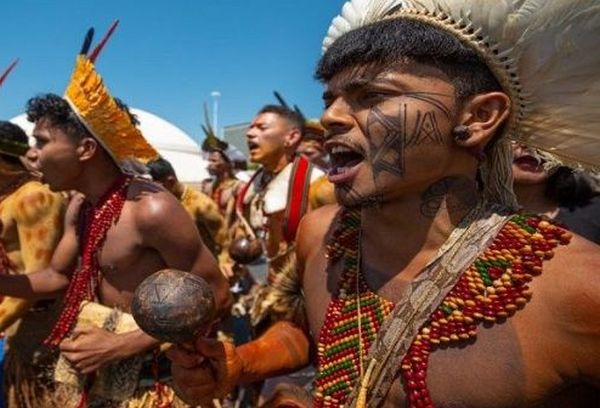
A four-day-long tribal meeting among the Brazilian Indigenous leaders has begun in the Amazon to protest far-right President Jair Bolsonaro’s push to open their reservations for commercial mining and agriculture.
The meeting, which is being attended by several tribal leaders, seeks to develop a contingency to combat Bolsonaro’s plan to exploit this historical region for commercial purposes. “The riches Bolsonaro speaks of are white man’s riches, to buy cars and planes and ranches. Our riches are in the forest and the rivers here,” the Kayapó tribe leader Megaron Txucarramãe told the Reuters News Agency.
The Brazil-based O Globo newspaper has received a draft copy of the legislation that is going to be presented by the government, which would not just open up the reservation to mining, but also to oil and gas exploration, the building of new hydroelectric dams and commercial farms with genetically modified crops currently banned by law on tribal lands.
According to the legislation draft that O Globo received, the Indigenous communities would be consulted on economic projects, as stipulated in Brazil’s Constitution, but they would not have the power to veto projects decided by the government.
“The year begins with this big meeting called by Raoni to draw up strategies to protect the Amazon from the threats, the criticism and the destruction that the Bolsonaro government is causing,” Sonia Guajajara, head of an umbrella group called the Articulation of the Indigenous Peoples of Brazil (APIB), told Reuters en route to Xingu in the frontier state of Mato Grosso.
She said some tribes that are planting soy may favor the easing of environmental restrictions, but the majority oppose mining on their lands. The Bolsonaro government, which declined to comment on the O Globo report, has said it is attending to tribal leaders seeking economic development who are ignored by high-profile indigenous advocates.
Protected tribal lands have seen increasing invasions by illegal loggers and miners since Bolsonaro became president last year, leading to a rise in deforestation, fires and deadly clashes on several reservations.
Bolsonaro has vowed to integrate Brazil’s roughly 900,000 indigenous people into the broader economy and society, while tapping the mineral riches and commercial farming potential of their 462 reservations.
Environmentalists say such a move will speed up clearing of the Amazon jungle, the world’s largest tropical rainforest, which is considered vital for slowing global climate change.
 Escambray ENGLISH EDITION
Escambray ENGLISH EDITION





Escambray reserves the right to publish comments.